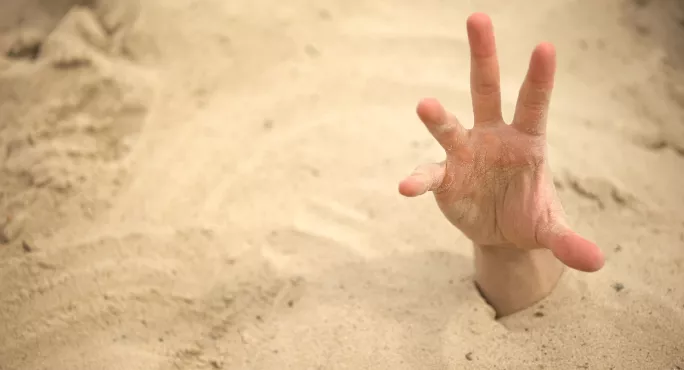When he was about eight years old, our son suddenly began behaving very oddly whenever we came to a beach.
Having previously rushed ahead of us on arrival, he took to hovering on the steps down, waiting for us to lead the way. He then followed on cautiously behind.
Why? Because of his blessed teacher, of course, who had apparently gone off on one in class. With the earthquakes lesson perhaps finishing earlier than expected, the teacher had spoken at length about the danger of quicksand, and the supposedly common tendency for people to sink unsuspectingly into it, then to flail around and disappear.
We tried to reassure our son that this was not something for which Swanage beach was particularly well known.
My guess is that the teacher concerned genuinely believed that quicksand regularly did this to people, because it was a “fact” that one of his own former teachers had told him. That teacher, in turn, was doubtless similarly misinformed at school, decades before that.
An international curriculum of nonsense
The origins of the teacher’s classic piece of quicksand claptrap (I remember being told a similar story about quicksand and deadly bogs when I was at school) perhaps date back to the adventure films of the 1960s. This was quicksand’s golden age, if you like, when one in 35 films featured the peril, according to one piece of impressively niche research.
Alongside the usual curriculum, teachers unwittingly deliver each year what we might call an international curriculum of nonsense. The Beware Quicksand module is plainly a core element there.
For generations, I like to think that we teachers have passed on plenty of valuable knowledge and wisdom to the young. But we have also unwittingly and repeatedly told them a whole load of baloney - other “b” words are available.
As teachers, I think we have three areas of knowledge. We all have our own comfort zones, where we disperse solid, oft-repeated knowledge. Equally, we have areas where we rightly and openly admit to varying degrees of ignorance (“Perhaps you’d like to look that up at home, Cedric”).
But the international curriculum of nonsense arises from there being a third region - a kind of hidden quicksand - where we think we are repeating a truth, but where we are actually just recycling the rubbish.
Not using enough of our brains
Another commonly taught element in said curriculum of claptrap is to tell children that water swirls out of a plughole in the opposite direction in Australia. Many of us have casually repeated this to children, simply because we were told it when at school. We have never really questioned it since. Again, it is a key body of knowledge that has been passed down from generation to generation, even though it’s wrong.
Many of us will have also told the young that goldfish instantly forget everything and that humans only use a tiny proportion of their brains. We sometimes do this even after we have heard reputable scientists assure us otherwise. I wonder why we continue regardless. Is it because we don’t use enough of our brains, or because we have the memory of a goldfish?
I have only mentioned a few of the common core elements in this alternative curriculum. There are plenty other such topics, even before we consider our own personal areas of specialist fictions and falsehoods.
In fairness, we should not underestimate the role of parents in keeping the traditional old hogwash flowing, especially during the recent months of lockdown and home-schooling.
Parental myths and misinformation rarely carry quite the same weight, however, compared with hearing them first-hand from the teacher’s mouth. By the age of about 10, many young people have habitually started to question everything a parent might try to teach them. But if a teacher tells a child that same piece of nonsense, they might believe it for eternity.
So thank goodness children are back at school this term. At last, they have the opportunity to catch up - not just on the useful stuff, but on the useless, too.
Stephen Petty is head of humanities at Lord Williams’s School in Thame, Oxfordshire




